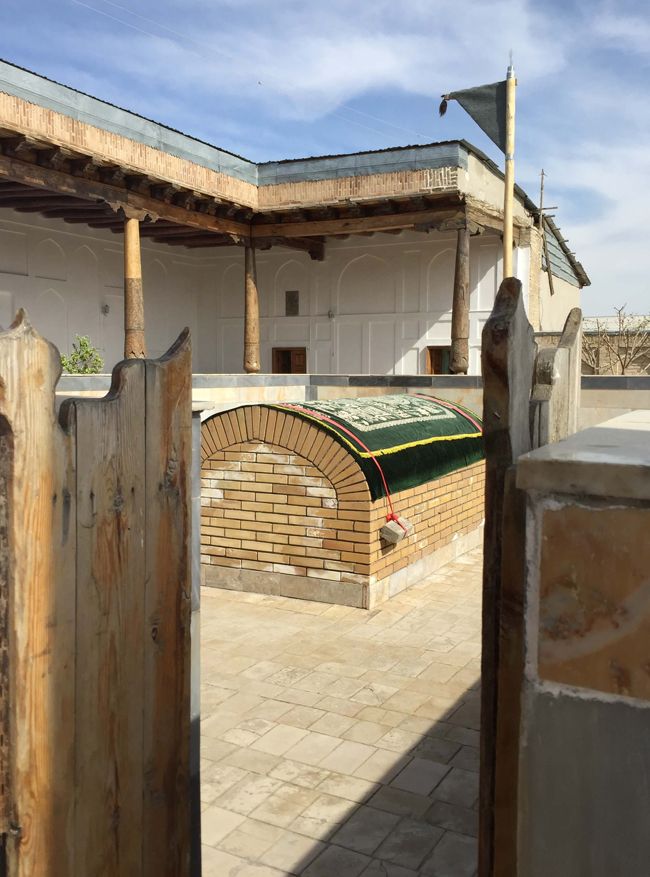-

 Know, the true nature of your Beloved.
Know, the true nature of your Beloved.
In His loving eyes, your every thought,
Word and movement is always –
Always Beautiful.
~ Hafiz
The Golden Chain

12. Khwaja Arif ar-Rivgari
Khwaja Arif ar-Rivgari (may God sanctify his innermost being) is the twelfth Shaykh in the Naqshbandi Golden Chain and the third of the ‘Khwajagan’ – the Masters of Wisdom of Central Asia. He was the fourth Deputy of Khwaja Abdul Khaliq al-Gijdivoniy, from whom he received the transmission of the Golden Chain.
Khwaja Arif was born in the village of Rivger, about 45 km north of Bukhara and lived to 130 years of age. He started studying the Islamic classics at a young age, displaying a brilliant intelligence and cognition that helped him to excel in his studies. Khwaja Arif was described as a fair faced man, of medium height. He met Khwaja Abdul Khaliq in Bukhara and entered the Khwaja’s service for the rest of the Khwaja’s life. He was known for the great love he had for his Master. He would often repeat what Khwaja Abdul Khaliq had told him, that “Every Muslim who is on the path of Truth, must always remember that for every moment he spends in peace and comfort, he must give thanks to God.”
In Bukhara Khwaja Arif was known as ‘Khwaja Mohitabon’ – the beautiful Master. One of his disciples wrote, “I could smell jasmine flowers when my Master entered the room for lessons.” After Khwaja Abdul Khaliq’s death, Khwaja Arif helped many students to reach high ranks of spirituality. He was widely known throughout the east and west, with his followers numbering more than 4,000.
At the time of the Mongol invasion, Khwaja Arif was the Grand Master of the Naqshbandi Order. According to popular legend, Ghengis Khan stopped in Rivger before beginning the siege of Bukhara. Most of the population had fled, but Khwaja Arif remained, working at a weaving loom of his own invention. Genghis Khan entered Rigver and was impressed by the Khwaja’s tranquil demeanor and by the skill with which he worked. He asked through an interpreter for an explanation. Khwaja Arif replied, “My outer attention is on my work and my inner attention is on the Truth; I have no time to notice what is happening in the world around me.”
Genghis Khan was so pleased with this reply that he ordered all the inhabitants of Rivger should be left in peace and invited Khwaja Arif to go with him to Bukhara to advise him as to whom he should trust.
The siege of Bukhara lasted a week, and the Mongols entered the city on 10th February, 1220. The citadel held out for another twelve days and all the defenders were killed. Apart from this, there was no massacre. The entire population was ordered to evacuate the city, which was given over to plunder. Owing to the severe winter, there was much suffering, so Khwaja Arif pleaded with Genghis Khan to let them return. Ghengis Khan accepted and allowed the population to return within a few days. Because of this, tens of thousands of lives were saved and Bukhara recovered more rapidly than other cities that were completely destroyed by Ghengis Khan..
Shaykh Arif died in the village of his birth and was buried there in 1239. He passed his secret to Shaykh Khwaja Mahmud al-Ingir al-Fagnavi.
May God be well pleased with him.
Source:- ‘The Naqshbandi Way – History and Guidebook of the Saints of the Golden Chain’ by Mawlana Shaykh Hisham.
‘Rashahat Ain al-Hayat – Beads of Dew from the Source of Life. Histories of the Khwajagan The Masters of Wisdom’ by Mawlana Ali ibn Husain Safi.
‘Masters of Wisdom of Central Asia’ by Hasan Shushud.
‘The Masters of Wisdom’ by John G. Bennett.
